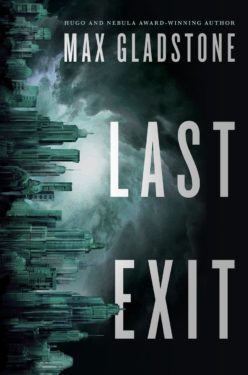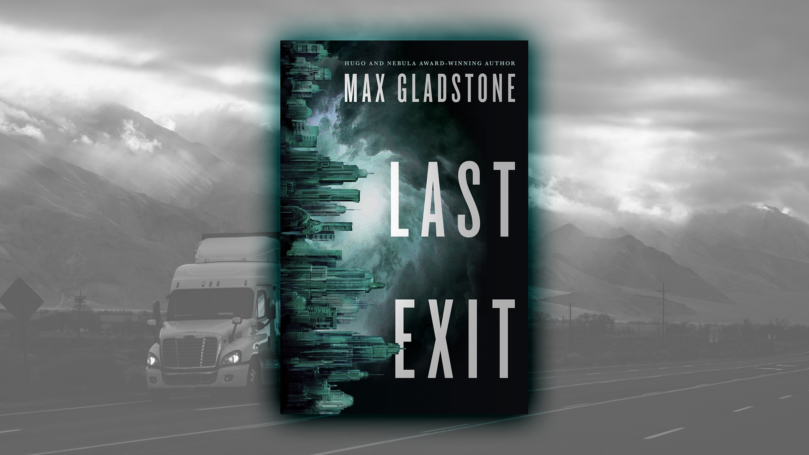 Max Gladstone’s Last Exit is the winding tale of a labyrinthian web of alternate realities, the poisonous rot that corrupts so many of them, and of a woman who once set off with her friends to find something better, or make it. But the writing of Last Exit held just as many twists as the resulting plot! Here, Max presents his story behind the story, and it’s an exciting one: Robbery, rumination, writing, and a shoutout to Bob Seger await. Check it out!
Max Gladstone’s Last Exit is the winding tale of a labyrinthian web of alternate realities, the poisonous rot that corrupts so many of them, and of a woman who once set off with her friends to find something better, or make it. But the writing of Last Exit held just as many twists as the resulting plot! Here, Max presents his story behind the story, and it’s an exciting one: Robbery, rumination, writing, and a shoutout to Bob Seger await. Check it out!
By Max Gladstone
I came home one hot Tuesday night in the fall of 2015 to notice that my notecards were out of order. And then, that my laptop was gone.
I’d left the house that afternoon after hours of sweating through a high-level revision. I knew something was off about the book I was writing, but I didn’t know what, and I was trying to figure it out through wishful thinking and office supplies. There were pacing problems that might be structure problems, or character problems that might be pacing problems, or…. Hard to say. So I tried something new: I wrote every major beat in the book on a notecard, spread the notecards on our dining room table with every leaf extended, and spent hours pacing around the table, moving scenes, tearing them up. Sometimes writing looks like correspondence chess with index cards, and sometimes it smells like huffing markers.
I left the cards in their careful grid on the table, and left—for a walk, for the gym. When I came home I found the cards jumbled together, half on the floor. Cat? We don’t own a cat. Did my wife come home early, read my notecard outline, and express extreme and uncharacteristically violent objections to a proposed reordering of the third act?
Oh wait, never mind. We’ve been robbed.
In 2011, a friend told me something terrifying. We were two writers—this is not the terrifying part, this is the context part—and our debut novels were both due out the next year. We’d met through mutual friends, and it was a relief to find someone else who was on more or less the same road, more or less by accident. I asked her, after we’d known each other long enough and had enough wine to talk about this sort of thing, about her book, about how she’d come to write it.
She said, well, it took me ten years to write this one. I wrote it the first time. That took five years. Then I realized I’d written it in the wrong voice. The wrong register. So I went back to the beginning, and wrote it again.
I don’t think I have ever respected a person more and understood them less than I did at that moment. The respect hasn’t changed. The understanding has.
Manuscripts, Bulgakov wrote, don’t burn. Contrariwise, I’m positive that novels can and do get stolen, but in my experience, thieves haven’t been all that interested. In 2017, while I was on tour for the release of The Ruin of Angels, my suitcase was stolen out of a parked car. “Don’t worry,” my host had said when I asked if I should bring it into the restaurant with us, “this is a very safe neighborhood.” The thief made off with clothes, a Kindle, my toothbrush, etc. They left my mass market paperback of Stephen King’s It, covered in broken glass.
(They kept my signed copy of Fonda Lee’s Exo, though, so maybe this just speaks to their individual taste. Or they’d already read the King.)
It was eerie, in 2015, how fast I got back to work after being robbed. The notecards weren’t even all that out of order. All seven drafts of the book were “safely” in “the cloud.” We had renter’s insurance, and renter’s insurance paid out. I’m typing this now on the computer the insurance bought. After a few hours spent changing passwords, I clicked, clicked again, and there was the manuscript. Same as it ever was.
In 2013, staring out the window at the highway at night on tour and feeling a bit like a Bob Seger song, I had an idea: roads as a kind of magical network, driving as a way to cast a spell. Highways that led to other worlds, that led off the map into the dark, into places where the world was different. The country as a kind of spell, casting itself. All of us working the magic, without understanding—driving the world into being, to ends we did not know and could barely guess. The road as a story.
I felt danger, out there in the dark. There was something wrong with the sky. It did not sit on top of the earth the way it used to. We were pretending everything was okay, when it wasn’t. There were oceans on maps that didn’t exist anymore. We were supposed to be doing things, changing things, and yet—where, and how? What, really, was being done? What now? What next?
I tried to write that book. I tried to write about some kids who wanted to change the world, and went out into the dark to try, only it didn’t work out like they hoped. And now they were older and had to try again.
And I did write that book. More or less. That was the one the thieves didn’t steal.
A road is a choice. A highway is a choice. A bridge is a choice. You might not be able to decide what towns will exist, but you can decide which ones will thrive. You cannot banish neighborhoods but you can cast them in shadow, blight them, drive their people out.
What is a story but a series of choices? For the characters, certainly, but for the writer as well: each word a choice in the context of every other word.
Sometimes you have to make different choices.
In the summer of 2019, I opened a notebook.
The book I had written, the one that was not stolen, was still there on the computer. But I felt so many things differently, and more deeply, than I had when the concepts and characters first met, years before. The threat remained, but nobody was pretending anymore. This wasn’t okay. We weren’t sure what this was. And it wasn’t even 2020 yet.
I wasn’t honest with myself even then. I thought, the book is good, the bones are good, the characters. I’ve written it so many times and revised it. All it needs is a new opening. I can get it right this time. A few tweaks through to smooth it in.
“It’s a dangerous business, Frodo, going out your door,” the man says. “You step onto the road, and if you don’t keep your feet, there’s no telling where you’ll be swept off to.”
I started to write. I was a new parent. I had minutes snatched between naps and feeding sessions. I had a nice pen and good paper. A line is like a road, or a trail. It circles, switchbacks, it does not take the crow’s route from point to point, and yet—if you’re walking, that’s the way to go.
I sent the chapter to my agent. I didn’t understand what was going on even then. I must have hoped they would say, “Great, just copy this over the first chapter and send it in.” I cannot, looking back, imagine how they would have said that.
What they said—well, they laid out a bunch of options. But the one I took was, keep going.
You do the thing once. It doesn’t quite work. Something’s still broken, something’s lost. Maybe even stolen. You’re older now, and the world looks darker.
So you set off on the road.
And maybe this time you can make better choices.
That’s my story. That’s our story. And that’s the story of Last Exit.
Purchase Last Exit Here:











